As a dog owner, you want to keep your furry friend healthy and safe from harm. But what if your dog eats something they shouldn’t, like birdseed? Is bird seed bad for dogs and what to do if their furry friend gets into a stash of seeds? While bird seed is not inherently toxic to dogs, it can pose some health risks if ingested in large quantities or if it is contaminated with mold or bacteria. In this blog, we will answer the question “Can dogs eat bird seed?” We will explore the potential dangers of bird seed for dogs, the symptoms to watch for, and what to do if your dog eats some. We’ll also learn how to keep your dog safe and healthy around bird feeders in this article.
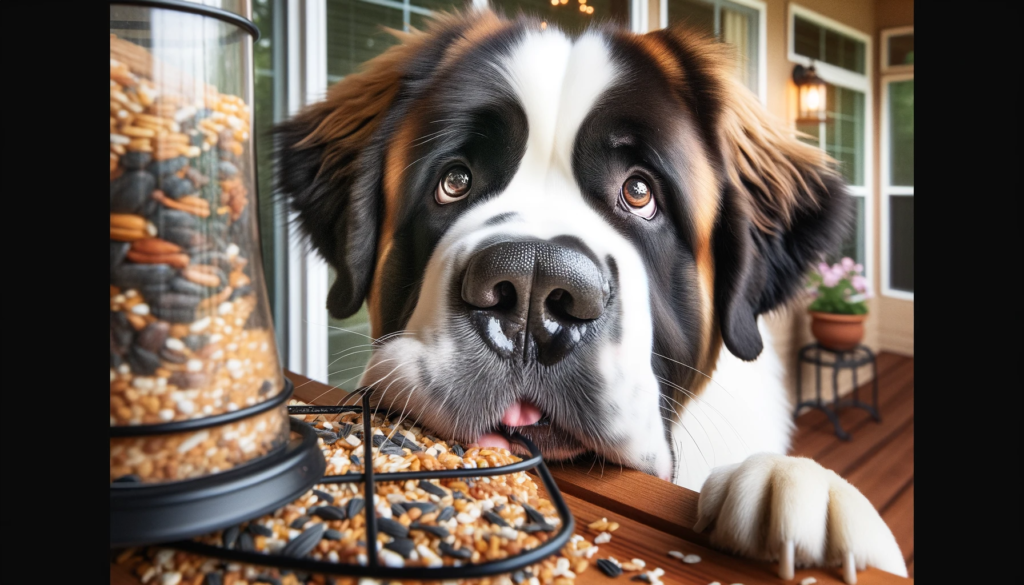
Do Dogs Commonly Eat Bird Seed?
It’s not uncommon for dogs to eat bird seed, especially if they have access to bird feeders or outdoor areas where wild birds congregate. Dogs may be attracted to the smell and taste of the seeds, or they may simply be curious and want to investigate the source of the food. Additionally, dogs may inadvertently ingest bird seed that has fallen onto the ground or onto catch trays under the feeders. Pet owners who enjoy feeding wild birds may also inadvertently contribute to the problem by offering seeds that are palatable to dogs, such as sunflower seeds or millet. Monitor your dog’s bird seed intake and prevent excessive consumption, although small amounts are usually harmless.
Reasons Why Dogs May Eat Bird Seed
Dogs may eat birdseed for a variety of reasons. One reason is simply curiosity – dogs are known for investigating their environment and may be drawn to the new and interesting sights and smells of bird feeders. Additionally, some dogs may be attracted to the taste and texture of certain types of bird seeds, such as sunflower seeds, nuts, or millet. These seeds are high in fat and protein, which can make them appealing to dogs. Dogs may also eat birdseed as a result of scavenging behaviors or because they are hungry and seeking additional sources of food.
In some cases, dogs may have a nutritional deficiency or other health issues that leads them to seek out non-standard food sources, such as bird seed. Monitor your dog’s bird seed intake to prevent overconsumption and potential health issues.
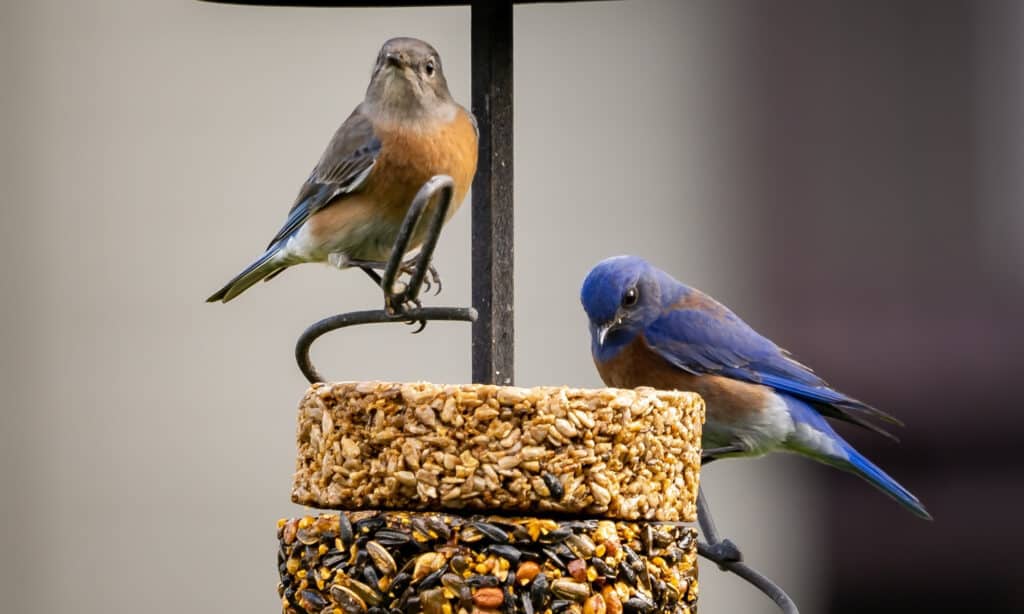
Possible Sources of Bird Seed for Dogs
Bird seed can be found in many outdoor locations where wild birds gather, such as bird feeders, parks, and natural areas. Pet owners who enjoy feeding wild birds may also have bird seed in their yards or on their decks. In addition to these sources, bird seed can also be found in commercial dog foods or treats. Some dog food manufacturers include bird seed or other grains in their formulations as a source of carbohydrates or fiber. Look for ingredients such as millet and sorghum in dog foods.
If your dog has access to bird feeders or other sources of seed, it’s important to take steps to prevent them from consuming large quantities that could lead to health problems. Move bird feeders away from your dog, use catch trays/screens to prevent seeds from falling, and clean up old seeds regularly.
What Could Be Bad About Your Dog Eating Bird Seed?
While bird seed is not inherently toxic to dogs, it can pose several health risks if ingested in large quantities or if it is contaminated with mold or bacteria. Some of the dangers of birdseed for dogs include:
- Mold: Bird seed can become moldy if it is not stored properly or if it is exposed to moisture. Moldy seeds can produce toxins that can cause serious health issues in dogs, including vomiting, diarrhea, seizures, and even death.
- Bacteria: Bird seed can also harbor harmful bacteria such as Salmonella, which can cause gastrointestinal issues in dogs.
- Blockage/Obstruction: Bird seed can cause digestive blockages in dogs if ingested in large amounts. This can lead to vomiting, diarrhea, lethargy, and other serious health issues that require medical attention.
- Bloating: Some types of seeds, particularly those that are high in fat and fiber, can cause bloating in dogs. This can be uncomfortable and can lead to more serious health issues if left untreated.
- Ingesting Dirt and Parasites: Bird seed can contain contaminants that dogs may ingest if they eat it, including dirt and other substances. This can lead to the ingestion of parasites or other harmful substances.
Overall, while bird seed may seem like a harmless snack for dogs, it’s important to monitor their intake and to take steps to prevent them from consuming large quantities or contaminated seed that could lead to health problems.
Health Risks Associated with Bird Seed
While bird seed may not be toxic to dogs, it can pose several health risks if ingested in large quantities or if it is contaminated with mold or bacteria. Some of the health risks associated with birdseed for dogs include:
- Gastrointestinal issues: Eating large amounts of bird seed can cause gastrointestinal upset in dogs, including vomiting, diarrhea, and abdominal pain. These symptoms can be mild to severe, depending on the quantity of seed ingested.
- Neurological symptoms: Moldy bird seed can produce toxins that can affect a dog’s nervous system. These toxins can cause symptoms such as tremors, seizures, and disorientation.
- Respiratory issues: Bird seed dust can cause respiratory issues in dogs, especially those with pre-existing respiratory problems.
- Blockage/obstruction: As previously mentioned, eating large quantities of bird seed can cause blockages or obstructions in a dog’s digestive tract. This can be a serious health issue that requires veterinary attention.
- Bloating: Some types of bird seed, particularly those that are high in fat and fiber, can cause bloating in dogs. This can be uncomfortable and can lead to more serious health issues if left untreated.
It’s important to note that the severity of these health risks can vary depending on the type and quantity of bird seed consumed, as well as the individual dog’s health and tolerance. Get veterinary help right away if your dog eats a lot of bird seed or shows signs of illness afterward.
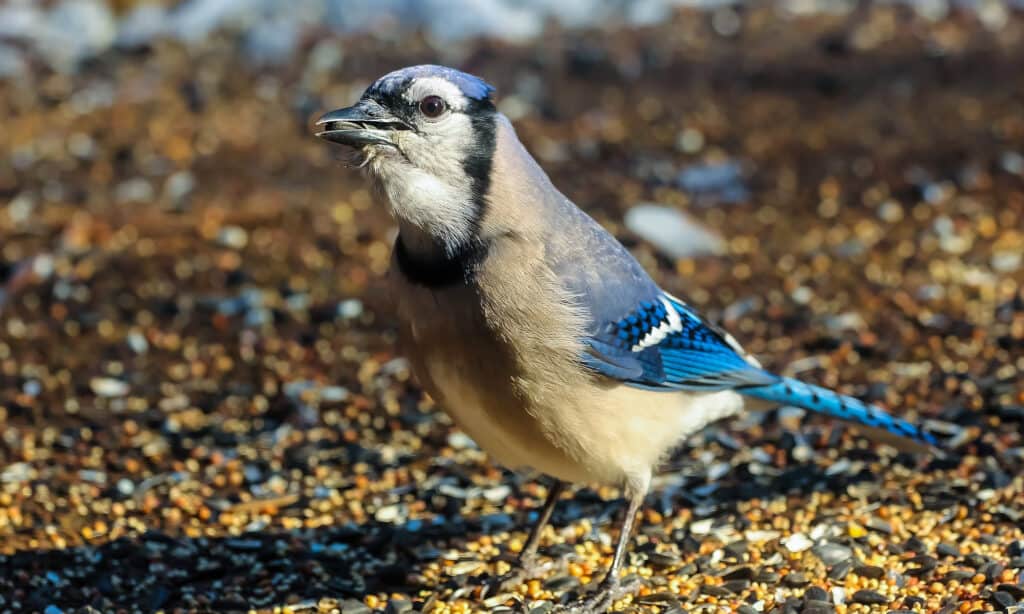
Dangers of Ingesting Dirt and Parasites
In addition to the health risks associated with the bird seed itself, there are also potential dangers associated with the dirt and other contaminants that may be present in the seed. Birds often ingest dirt and other debris along with the seeds, and dogs that eat bird seed may also ingest these substances. This can lead to the ingestion of parasites or other harmful substances.
Eating birdseed mixed with dirt can expose dogs to harmful substances like pesticides or fertilizers.
It’s important to take precautions to prevent your dog from ingesting dirt or other contaminants along with the bird seed. This may include cleaning up spilled seed regularly, moving bird feeders to areas where your dog cannot access them, or using screens or catch trays to prevent seed from falling to the ground.
Symptoms to Watch for in Dogs that Ate Bird Seed
If your dog has ingested bird seed, it’s important to monitor them for any symptoms of illness. While most dogs may not show any adverse effects from eating small amounts of bird seed, others may experience symptoms that indicate a more serious health issue. As highlighted above, some of the symptoms to watch for in dogs that have eaten bird seed include:
- Gastrointestinal issues
- Neurological symptoms
- Respiratory issues
- Blockage/obstruction
- Bloating
The severity of the symptoms can vary depending on the amount and type of seed ingested, as well as your dog’s individual health and tolerance. Early intervention can help prevent more serious health issues and ensure that your dog receives the care they need.
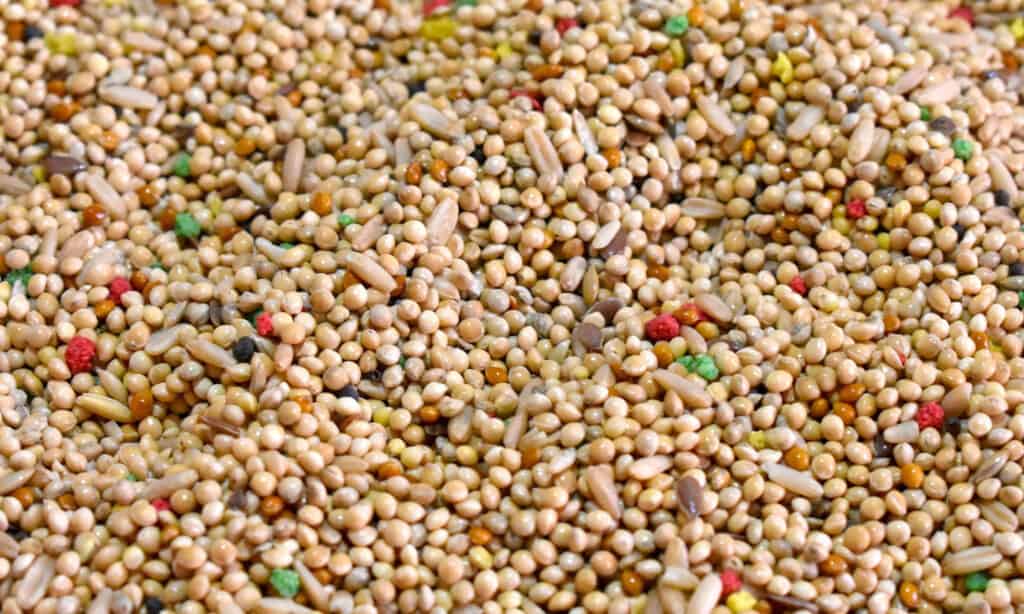
When to Take Your Dog to the Vet for Eating Bird Seed
If your dog has eaten bird seed and is exhibiting symptoms of illness, it’s important to seek veterinary attention immediately. Even small amounts of contaminated or moldy bird seed can cause serious health issues in dogs, and early intervention can help prevent more serious complications.
Some signs that may indicate your dog needs veterinary attention after eating bird seed include:
- Vomiting or diarrhea that lasts longer than 24 hours
- Refusal to eat or drink
- Lethargy or weakness
- Abdominal pain or distension
- Difficulty breathing
- Seizures or other neurological symptoms
If your dog has ingested a large amount of bird seed, or if they are exhibiting any of these symptoms, it’s important to seek veterinary attention as soon as possible. Your veterinarian can perform a physical exam and may recommend diagnostic tests such as blood work or imaging to determine the underlying cause of your dog’s symptoms. Treatment may include medication, fluid therapy, and supportive care to address symptoms and help your dog recover from gastrointestinal issues.
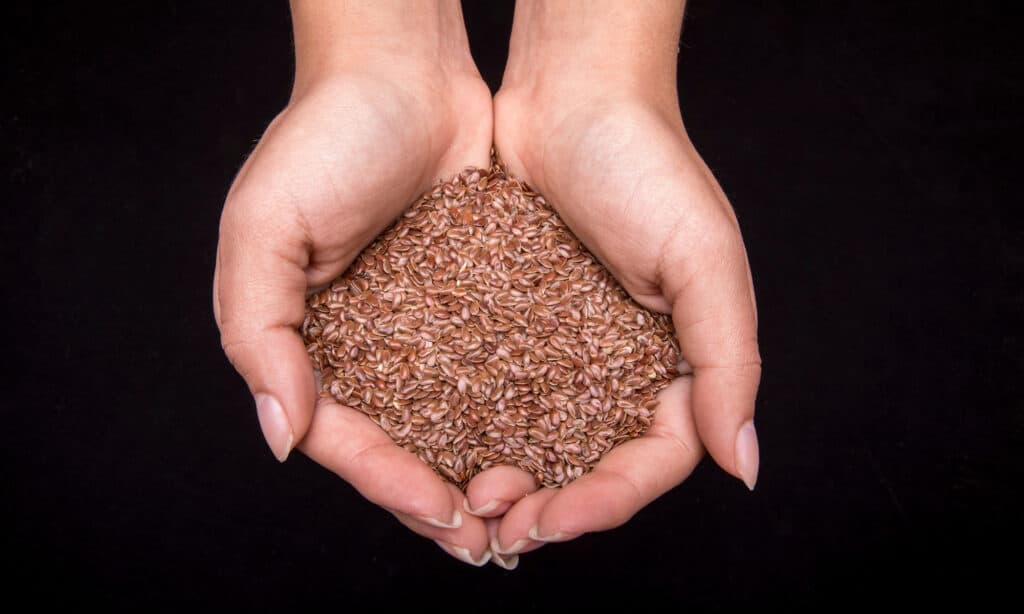
Possible Solutions for Your Dog Eating Bird Seed
If your dog has a habit of eating bird seed, there are several steps you can take to prevent this behavior and keep your pet safe. Some possible solutions include:
- Move bird feeders: Move bird feeders out of your dog’s reach to prevent them from accessing bird seed. Hang feeders out of reach to prevent your dog from getting to them.
- Use catch trays: Using catch trays under bird feeders keeps seeds from falling to the ground, out of reach of dogs.
- Clean up old seeds and waste: Clean up old seeds and waste to prevent contaminated seed ingestion by your dog.
- Supervise your dog: Supervise your dog around bird feeders to keep them from accessing the seeds.
- Consider deterrents: Bitter sprays and motion-activated deterrents can discourage dogs from eating bird seed.
- Check your dog’s diet: If your dog eats bird seed, they might be hungry or deficient. Clean up old seeds, reevaluate their diet, and add food or supplements.
Remember, prevention is key when it comes to keeping your dog safe from the potential health risks associated with eating bird seed. By taking proactive steps to prevent your dog from accessing seed, you can help ensure that they stay healthy and happy.
Other Ways to Deter Your Dog from Eating Bird Seed
If your dog has a habit of eating bird seed, there are several additional steps you can take to discourage this behavior and keep your pet safe. Some possible methods for deterring your dog from eating birdseed include:
- Provide alternative sources of entertainment: Dogs may be more likely to eat birdseed if they are bored or have nothing else to do. Offering toys, exercise, and mental stimulation to your dog can deter seed consumption for amusement.
- Train your dog: Teaching “leave it” and “drop it” commands can prevent dogs from accessing harmful items like bird seed.
- Use positive reinforcement: Rewarding good behavior can reinforce positive habits and discourage undesirable ones like eating birdseed.
- Use physical barriers: Fencing around birdseed areas can prevent dogs from accessing it.
- Consider behavioral therapy: Address your dog’s bird seed-eating with an animal behaviorist’s help to tackle anxiety or behavioral issues.
Remember, every dog is different, and what works for one dog may not work for another. Be patient and persistent in pet training, and work with professionals to ensure the best outcome for your furry friend.
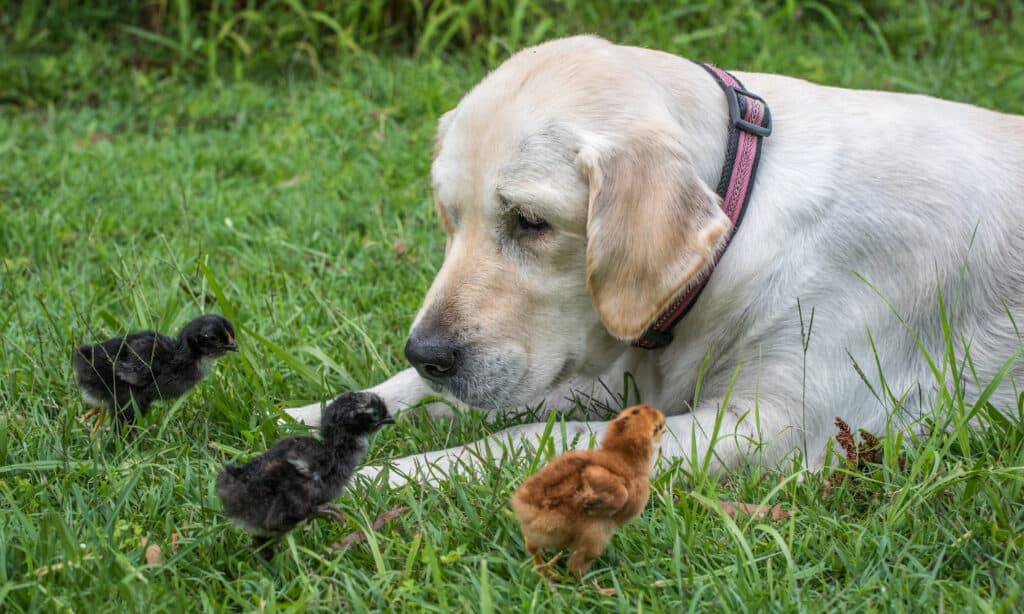
Conclusion
In conclusion, while birdseed is not inherently toxic to dogs, it can pose several health risks if ingested in large quantities or if it is contaminated with mold or bacteria. If your dog has a habit of eating bird seed, it’s important to take proactive steps to prevent this behavior and keep your pet safe. Secure bird feeders, use catch trays or screens to prevent seed spillage and regularly clean up to keep dogs away.
It’s also important to monitor your dog for any symptoms of illness after they have ingested bird seed. Early intervention can help prevent more serious health issues and ensure that your dog receives the care they need. Promptly seek veterinary attention if your dog shows signs of illness after consuming bird seed for the best outcome.
Remember, prevention is key when it comes to keeping your dog safe from the potential health risks associated with eating bird seed. By taking proactive steps to prevent your dog from accessing seed and monitoring their health closely, you can help ensure that they stay healthy and happy. With a little effort and attention, you can keep your furry friend safe and sound while enjoying the beauty of backyard birds.
~Sheena
